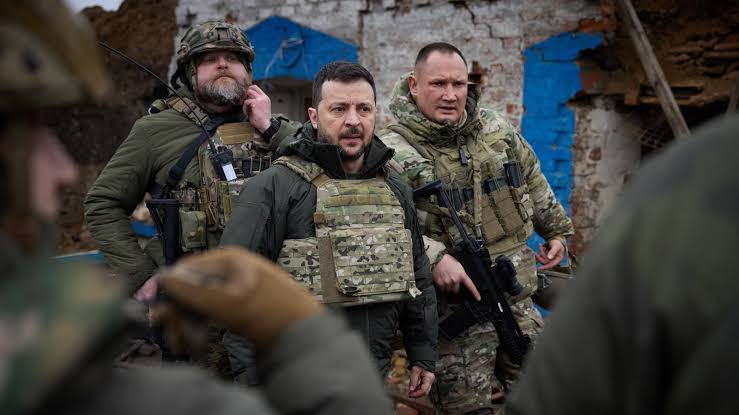
Europe in the grip of ‘èdì’ over Ukraine
By Femi Olugbile
There is a concept in Yoruba folklore that describes a person acting under the metaphysical influence of a malign force. It is called èdì.
The issue in focus, is of course, the war in Ukraine.
The predominant narrative, which is vigorously articulated and fiercely defended not just by the governments of Europe and the United States of America, but also by virutally all the recognized outlets of the ‘Free Press’, goes as follows. On the 24th day of February, 2022, Russia invaded Ukraine, a peaceful democratic nation with great affinity for the Western way of life and an interest in joining the North Atlantic Treaty Organisation (NATO) to guarantee its safety and prosperity. It was the largest attack on a European country since World War II. The Ukrainians rose corageously to defend their land. Despite the fact that, within a few months, the Russians were occupying 20% of Ukrainian territory, the war was not the one-sided roll-over many had feared.
The war has been very traumatic for the people of Ukraine. Of a population of 41 million, 8 million became internally displaced within a year. Another 8 million fled to other European countries, creating Europe’s largest refugee crisis in several decades.
The Russian invasion, which President Putin described as a ‘Special Military Operation’, has been widely condemned by the international community. In March 2022, the UN General Assemby passed a resolution demanding a full Russian withdrawal. The Council of Europe expelled Russia from its ranks. The International Court of Justice ordered a suspension of military operations. Widespread public protests against Russia followed, as well as drastic sanctions designed to bring the aggressive country to heel economically.
In 2023, the ICC issued arrest warrants against Putin and three other Russians, for unlawful deportation of children and other crimes against humanity.
From this narrative, it is clear who is right, and who is wrong.
But a cursory search for context begins to blur these demarcations. Military conflict between Ukraine, Russia, and some Ukrainian citizens who were described as ‘Russian proxies’, actually started in 2014. This followed what Ukrainians officially called the ‘Revolution of Dignity’ or ‘Maidan Revolution’. Armed clashes in the capital Kyiv between the state forces of President Viktor Yanukovych and right wing insurrectionists led to the overthrow of the President. The elected President of Ukraine fled to Russia. Pro-Russian, anti-Revolutionary violent protests commenced in southern and eastern parts of the country, leading to the outbreak of the 2014 Russo-Ukrainian War, and providing a pretext for the Russian annexation of Crimea. The protesting Ukrainian citizens were demanding union with Russia, referendums on the status of Eastern and Southern Ukraine, and creation of Donetsk, Odesa, Kharkiv and Luhansk People’s Republics.
Language, religious and political links between Russia and Ukraine go back a long way. Khruschev, one of the Presidents of USSR, was Ukrainian.
But for Western Europe, and its ‘free press’, the world began in February 2022, with the invasion of hapless Ukraine by a ruthless dictator with neo-Tsarist, hegemonic ambition. According to Freudian Psychoanalysis, a notion and its opposite may be equally valid, and relevant, in human psychology.
Ukraine has had the benefit, or the burden, of a courageous, charismatic leader named Volodimir Zelenskyy in the prosecution of the war with its bigger neighbour. Its avowed aim is to ‘defeat’ Russia, whatever than means!
The current situation is that despite the courage and resilience of its people, the war is going badly for Ukraine. Europe and USA are straining themselves to supply weaponry and funds which are a great help, but are never going to be quite sufficient. Europeans stress the line that they are helping Ukraine in its war, but they are not themselves at war with Russia. In the USA, a President Trump, if elected, may yet upset the whole apple-cart. Meanwhile Ukraine is bleeding Ukrainian lives. It’s military brass have just announced they need another half a million soldiers in the field. The government has lowered the draft age. Many of the young men still left at home are seeking ways to escape abroad. There is no exit strategy in view. Any talk of dialogue is angrily slapped down. The other day, even the Pope was shut down when he dared to suggest peace talks.
The views of two notable Nobel laureates are worth sharing, in rounding up this sad discussion. Henry Kissinger, America’s apostle of détente and shuttle diplomacy, has this to say:
‘…Ukraine has been independent for only 23 years…its leaders have not learned the art of compromise, even less historical perspective…For the West, the demonisation of Vladimir Putin is not a policy; it is an alibi for the absence of one…Ukraine should …choose… its economic and political associations…Ukraine should not join NATO…’
Jeffrey Sachs, the American Economist and radical thinker, is blunt in his condemnation of the sanctimonious posturings of Europe and America that have led to the present sad pass.
‘…in December 2021, Putin said, ‘Look, stop the NATO enlargement. We can avoid an escalation’…I talked to the White House at that point. They thought they had all the cards. We’re going to cut them out of the SWIFT banking system…bring the economy to its knees…Within a week, Zelensky said ‘Okay…we can be neutral…’ the Turks mediated negotiations…The US intervened and told the Ukrainians ‘You keep fighting’…it’s Ukrainians dying, not Americans. They’re weakening Russia…So another $61 billion…the latest plan is to take illegally confiscated assets of Russia…That’ll be really great for the international financial system…these are people who don’t think ahead…they just improvise day by day…’
To borrow a Lagos street slang, the Ukrainians need to ‘borrow themselves sense’. They must cease allowing themselves to be led by the nose by distorted history, by primordial anger against other Ukrainians who don’t think like them, and by a ‘Free Press’ which calls them ‘Heroes’, even as they walk down a slippery path to individual doom and national ruination.
